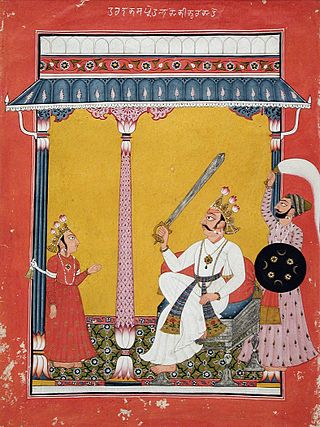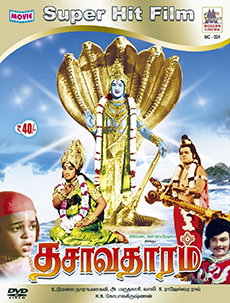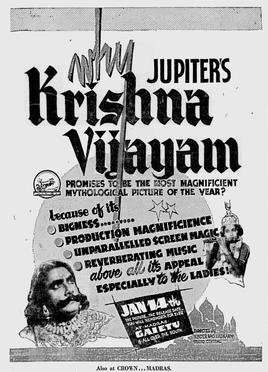
Hiranyakashipu, also known as Hiranyakashyap, was a daitya king of the asuras in the Puranas.

Avatar is a concept within Hinduism that in Sanskrit literally means 'descent'. It signifies the material appearance or incarnation of a powerful deity, or spirit on Earth. The relative verb to "alight, to make one's appearance" is sometimes used to refer to any guru or revered human being.
In Hinduism, Itihasa-Purana, also called the fifth Veda, refers to the traditional accounts of cosmogeny, myths, royal genealogies of the lunar dynasty and solar dynasty, and legendary past events, as narrated in the Itihasa and the Puranas. They are highly influential in Indian culture, and many classical Indian poets derive the plots of their poetry and drama from the Itihasa. The Epic-Puranic chronology derived from the Itihasa-Puranais an influential frame of reference in traditional Indian thought.

The Bhagavata Purana, also known as the Srimad Bhagavatam, Srimad Bhagavata Mahapurana or simply Bhagavata (Bhāgavata), is one of Hinduism's eighteen major Puranas (Mahapuranas) and one of the most popular in Vaishnavism. Composed in Sanskrit and traditionally attributed to Veda Vyasa, it promotes bhakti (devotion) towards Krishna, an avatar of Vishnu, integrating themes from the Advaita (monism) philosophy of Adi Shankara, the Vishishtadvaita of Ramanujacharya and the Dvaita (dualism) of Madhvacharya. It is widely available in almost all Indian languages.

Sharabha or Sarabha is an eight-legged part-lion and part-bird deity in Hindu religion, who is described as more powerful than a lion or an elephant, possessing the ability to clear a valley in one jump in Sanskrit literature. In later literature, Sharabha is described as an eight-legged deer.

The Buddha is considered the ninth avatar among the ten major avatars of the god Vishnu, according to the Vaishnava tradition of Hinduism.
Vishnu Puran is an Indian television series, by B. R. Chopra on the Hindu deity Vishnu. It is based on the Bhagavata Purana. Bhagavata Purana tells about the 10 incarnations of Vishnu, as well as other stories, such as the legend of Dhruva. The weekly series first aired Sunday morning, 23 January 2000 on Zee TV. The 124 episodes were later released on DD National.
Gautama Buddha, the founder of Buddhism, is also venerated as a manifestation of God in Hinduism and the Baháʼí Faith. Some Hindu texts regard Buddha as an avatar of the god Vishnu, who came to Earth to delude beings away from the Vedic religion. Some Non-denominational and Quranist Muslims believe he was a prophet. He is also regarded as a prophet by the Ahmadiyyah.

The Dashavatara are the ten primary avatars of Vishnu, a principal Hindu god. Vishnu is said to descend in the form of an avatar to restore cosmic order. The word Dashavatara derives from daśa, meaning "ten", and avatāra, roughly equivalent to "incarnation".

Vishnu, also known as Narayana and Hari, is one of the principal deities of Hinduism. He is the supreme being within Vaishnavism, one of the major traditions within contemporary Hinduism.

Sri Krishnanjaneya Yuddham is a 1972 Indian Telugu-language Hindu mythological film, produced by D. N. Raju and directed by C. S. Rao. It stars N. T. Rama Rao, Devika, Vanisri, S.V. Ranga Rao and Rajanala, with music composed by T. V. Raju.

Sri Radha Krishna-Chandra Temple is one of the largest Krishna-Hindu temples in the world. It is situated in Bangalore in the Indian state of Karnataka. The temple is dedicated to Hindu deities Radha Krishna and propagates monotheism as mentioned in Chandogya Upanishad.
Jai Hanuman is a 1997 Indian television series based on the life of the Hindu deity Hanuman, an avatar of Shiva, in Hindi. It was directed by Sanjay Khan. The series was initially shown on the state-run DD National, and was later shown on Sony Entertainment Television in 2008.

Vishvarupa, also spelt as Vishwaroopa and known as Virāḍrūpa, is an iconographical form and theophany of a Hindu deity, most commonly associated with Vishnu in contemporary Hinduism. Though there are multiple Vishvarupa theophanies, the most celebrated is in the Bhagavad Gita, given by Krishna in the epic Mahabharata, which was shown to Pandava prince Arjuna on the battlefield of Kurukshetra in the war between the Pandavas and Kauravas. Vishvarupa is considered the supreme form of Vishnu, where the whole universe is described as contained within him.
Besides the Ashtabharya, Krishna is described to have married several thousand women, he rescued from the demon Narakasura. The Bhagavata Purana and the Mahabharata state that 16,000 women were rescued, however the Vishnu Purana and the Harivamsa differ and set the number as 16,100. Generally all of them are unnamed, however many commentators of the Bhagavata Purana regard Rohini to be their leader, though such an explicit mention is not found in the scripture.

Dasavatharam is a 1976 Indian Tamil-language Hindu mythological film, directed and written by K. S. Gopalakrishnan. The film, based on the Dashavatara of Vishnu, features an ensemble cast, including Ravikumar as Vishnu. It was released on 15 January 1976.
The Srimad Bhagavata is one of the main books of Hindu philosophy. The Bhagavata is a devotional account of the Supreme Being and His incarnations. Book 1 of the Srimad Bhagavata discusses the origin of the Bhagavata, and introduces the reader to the glories of Krishna as the Supreme Lord. This book consists of 19 chapters. The Bhagavata is authored by Veda Vyasa and the source material for this summary is the translation presented by Swami Tapasyananda. Additional material and analysis is included.

Krishna Vijayam is a 1950 Indian Tamil language film written and directed by Sundar Rao Nadkarni. The film featured Carnatic music singer N. C. Vasanthakokilam in the role of Narada. The film, based on the Epic story of Krishna avatar, featured later day playback singer A. L. Raghavan as the child Krishna. Adult Krishna was played by P. V. Narasimha Bharathi. It was released on 14 January 1950.

Dashabatar Cards or Dashavatari Ganjifa are playing cards from West Bengal used to play certain games. They first originated in Bishnupur, a town in Bankura District. King Bir Hambir is attributed to the invention of these cards in the 16th century. The ten avatars of Bishnu are featured in the cards. It is a unique example of Bengal’s folk art.









